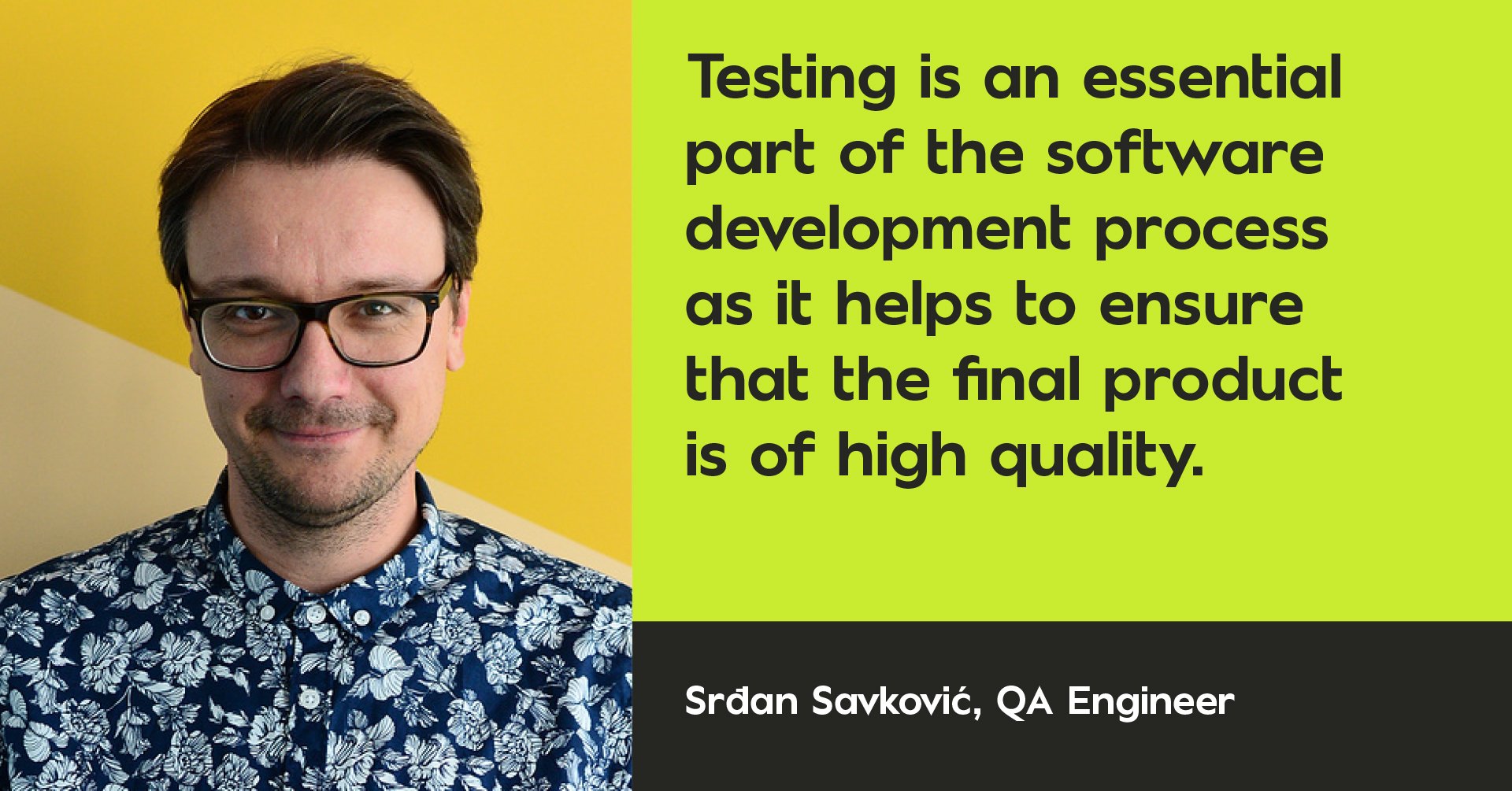Quality Assurance is an essential part of any software development project. The QA team is there to help you ensure your product meets all the standards and requirements and that no time or resources are wasted on fixing issues that could have been prevented. To paint you a clearer picture of the importance of this stage, we talked to our QA Engineer, Srđan Savković.
What does a QA Engineer do?
A QA Engineer is responsible for testing and evaluating the quality of software products to ensure they meet the requirements and specifications set by the client. This is done by monitoring every phase of the development process, including design, development, testing, and delivery.
As a QA Engineer, I work closely with software developers, project management, the design department, and other stakeholders to ensure that software is reliable, performant, and user-friendly. To do that, my team creates test plans, cases, and reports, tracks defects, and implements automated testing tools and frameworks.

What phases does a project go through?
1. Requirement gathering and analysis: This phase involves identifying the needs of the stakeholders and determining the requirements for the software. This is an important phase as it sets the foundation for the entire project.
2. Design: This phase involves creating a detailed plan for the software, including the architecture, user interface, and functional requirements. Getting a good design is essential as it will make the software easy to use, maintain, and test.
3. Implementation: This phase involves the actual coding and development of the software. This is where the design is brought to life, and the software starts to take shape.
4. Testing: This phase involves testing the software to ensure it meets the requirements and is free of defects. This is important to ensure that the software is reliable and of good quality.
5. Deployment: This phase involves delivering the software to the end users and making it available for use. It's important to have a good deployment process to minimize disruptions to the end users.
6. Maintenance: This phase involves providing support and updating the software as needed. This is important to ensure that the software continues to meet the needs of the stakeholders and remains up-to-date.

What industries do you have experience with?
My QA journey started in the pharmaceutical industry. There I worked on software solutions that were designed to track data collection verification using the eCOA solutions. After I joined Valcon, I was able to broaden my horizons and was able to work in different types of industries, such as Airport Parking solutions, SOSPES Enforcement, Property management, B2B fintech, and gaming industry key and SKU management, to name a few.
How important is the testing phase of a project?
Testing is an essential part of the software development process as it helps to ensure that the final product is of high quality and to identify any usability issues. One of the goals is to ensure that the software is user-friendly.
Additionally, testing allows developers to identify and fix bugs early on in the development process, which can save time and resources in the long run. Overall, the testing phase of a project is critical for ensuring that the final product is reliable, functional, and meets the needs of the end users.
What happens if someone decides to skip the testing phase?
The software may contain defects that can lead to unexpected behavior, crashes, or security vulnerabilities. These defects may not be discovered until the software is in use, resulting in poor user experience, lost business, and damage to the company's reputation.
Additionally, skipping the testing phase can lead to increased costs as the defects will likely need to be fixed later on in the development process or in the post-deployment phase, which can be more time-consuming and costly than catching them early on.
It can also cause legal issues and compliance breaches. Therefore, skipping the testing phase can ultimately lead to a less reliable, less functional, and less secure software product, which may negatively impact the company and its customers.
What kinds of tests does Valcon do?
The various types of testing are not mutually exclusive. They often overlap and are used in combination to provide a comprehensive evaluation of the software's quality.
- Functional testing is used to ensure that the software functions as intended and meets the requirements.
- Integration testing is used to ensure that different components of the software work together properly.
- System testing is used to evaluate the overall performance of the software and ensure that it meets the requirements of the end users.
- Acceptance testing is used to ensure that the software meets the acceptance criteria defined by the client.
- Regression testing is used to ensure that changes to the software do not introduce new defects or break existing functionality.
- Performance testing is used to evaluate the software's performance and scalability, and it includes load and stress testing.
- Usability testing is used to evaluate the usability of the software, which includes the software's learnability, efficiency, memorability, errors, and satisfaction.
What is it like to work with clients remotely? What does communication look like? Is there a language barrier?
Working with clients remotely can have its own set of challenges, but with the right tools and communication strategies, it can be done effectively. Communication with remote clients typically involves a combination of email, instant messaging, phone calls, and video conferencing. Depending on the project, there may be regularly scheduled meetings, such as daily standups, weekly status update calls, or ad-hoc meetings as needed to discuss specific issues or questions that arise.
It's important to have clear and regular communication to ensure that the client is informed of the project's progress and to address any concerns they may have.
For crucial stages in the project, for instance, the kick-off, sometimes we come on-site at the customer’s office, or their delegates will come to us to work together.
In my work, I haven’t found language to be a barrier since all of our team members are bilingual, which is not uncommon for SE Europeans.Do you often cooperate with other teams? Which ones? How does that work?
It is vital to work closely with other teams throughout the software development process. Working with the development team ensures that software meets the requirements and is free of defects. A QA engineer provides feedback on bugs, tests new features, and reports defects.
Working with the product team and other stakeholders ensures that the software meets the needs of the end users. This helps in identifying areas of improvement in the software development process and working to implement solutions to improve the overall quality of the product.
Working with the design team ensures that the software functions as intended and meets the requirements specified in the design documents.
Working with the support team ensures that the software can be supported and maintained after it is released.To Sum Up…
Going through with a project and skipping the quality assurance phase could be detrimental. As Srđan explained, the consequences could be a dent in your reputation or even a legal battle. There are different kinds of tests you could do, but the best approach is to test your product on several levels.
Valcon’s QA testing team is there to help you – our job is to put our rich experience and toolset to use by ensuring your product is of the best quality possible. Give us a call, and we’ll do the rest.


